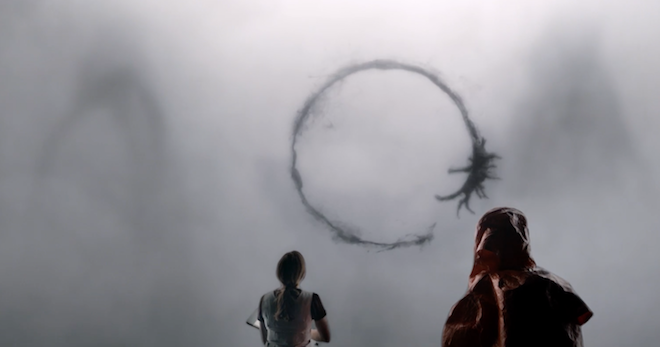Denis Villeneuve is one of the best filmmakers working today. His last two films, 2013’s Prisoners, of which we rated very highly at the time of its release, and 2015’s Sicario, which made it on our Best Films of 2015 list showcased a true talent, as each film was incredibly unique with its human nature-based story, and yet Villeneuve was able to make them both compelling. And now, with Arrival, Villeneuve sets his brilliant style and pacing on a science fiction story, and in so doing, shows the world that he could direct the phone book and make it interesting.
In Arrival, 12 alien constructs land on earth in 12 very unique places across the globe (Montana?) Our new visitors come speaking a language that, understandably, no one on Earth can understand. And only with the help of a damaged linguist (Amy Adams) and a mathematician (Jeremy Renner), working with teams from other nations across the globe, can humanity solve the riddle of what the visitors want, why they are here, and what it means for humanity going forward.
Arrival opens with Louise Banks (Adams), raising a daughter — playing with her in the yard as a toddler, helping her with homework, getting into arguments as she seems to hit the teen years, and ultimately losing the young girl to a rare disease shortly after. The scene is heartbreaking and emotional, calling back to the beginning of Pixar’s UP.
When next we see Louise, she’s buried in her work, teaching foreign language at a university, teaching a class on the same day of the arrival. As can be expected, the fear of the unknown causes great unrest for all of humanity — not just in the United States, but in major cities worldwide, and there is a sense of wonder — and terror — at seeing huge pill-shaped pods hovering above the earth. Louise is shortly visited by Colonel Weber (Forest Whitaker), as the U.S. Department of Defense needs her help in deciphering the language of the aliens. Louise had done some work for the DOD in the past and still had high security clearance. She joins the team and meets Ian Donnelly (Renner), a mathematician, and together, they get to work to solve the mystery of the arrival.
Arrival’s script has many twists and turns, and believe me, there is so much more going on than my short description can relay. The aliens communicate in a series of “writings” that are inky, living rings. Each ring is a complete sentence — as Louise figures out — and she is able to decipher the language, only by first teaching the visitors about our language. But this is only one small part of Arrival, as in the second act, things get tense due to human nature, and in the third act, the entire film takes the audience for a loop and forces those watching the film to ask ourselves some tough questions. These questions bring up time itself, and there were a great many conversations after the film about the meaning of it all.
So, as you can see, this isn’t just some aliens-land-on-earth sci-fi romp. There are some very deep themes at play here, and the script by Eric Heisserer, based off the short story by Ted Chiang, conveys these themes wonderfully. And while the performances from the leads are strong across the board, and the script is one of the best of 2016, Denis Villeneuve’s direction is what really makes Arrival a contender for best film of the year. His use of long shots, filling in the screen with as much visual information as he can, then slowly pulling the shot forward builds tension and wonder and makes even the most boring, stagnant scene feel alive. Then a quick cut to a medium shot of a face for reaction or a bit of dialogue, only to go back to another moving long shot creates a sense of poetry. He does it better than most, and Villeneuve’s directing style, coupled once again with composer Johan Johannsson’s (Sicario and Prisoners) incredible score is another out of this world winner.
Arrival is a film that will get people talking long after the final credit has rolled. It has that type of “open to interpretation” feel that most great films have (does anyone know what Bill Murray whispered to ScarJo at the end of Lost in Translation? Can anyone definitively explain the original cut of Donnie Darko? Did the top stop spinning in Inception?) and Arrival will join that long list of examples and for very good reason.
What I found most interesting is the reaction of the people in the film to the arrival, because of that great and fearful unknown. Here we are, three days after the worst U.S. election in our history, and I can turn on any major news outlet and see these same types of gatherings and talking heads yammering about that same kind of uncertainty. I can’t say that the filmmakers predicted that Arrival would open after such an election and the juxtaposition of the two would work so well together, nor am I saying that the president-elect is a huge pod driven by aliens (though it would help make some sense of things), but humanity’s reaction is almost the same, and at the end of the day, Arrival seems to be art — very high art — imitating life. For better or worse.
Arrival is rated PG-13 and is in theaters now.







